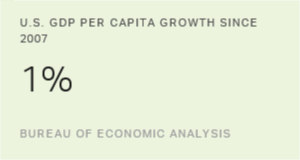Story Highlights
- Gallup presents the most notable stories of the past year
- Presidential campaign dominates headlines
- Orlando massacre, Electoral College and police top-of-mind for most Americans
WASHINGTON, D.C. -- Keeping Gallup's commitment to deliver analytics and advice to help leaders and organizations solve their most pressing problems, stories on Gallup.com in 2016 chronicled the U.S. presidential election as well as trends on Americans' views about taxes, the police, economic confidence and a host of pressing social issues.
The following are among the top stories on Gallup.com for 2016:
Red States Outnumber Blue for First Time in Gallup Tracking: As a possible precursor to the close 2016 election, a Gallup analysis of political party affiliation at the state level for the year 2015 showed Republican states outnumbering Democratic states for the first time since Gallup began tracking this in 2008. Twenty states were solidly Republican or leaning Republican, while 14 states were solidly or leaning Democratic. The rest were considered competitive.
Majority of Americans View Cuba Favorably for First Time: As President Barack Obama re-established diplomatic relations with Cuba, a majority of Americans, 54%, saw Cuba in a positive light for the first time in Gallup polling history. As recently as 2006, less than half as many (21%) expressed the same view.
Most Americans in 15 Years Say Their Tax Bill Is Too High: Just before Tax Day 2016, 57% of Americans said their tax bill was too high. This was the highest percentage since 2001, before President George W. Bush enacted sweeping tax cuts. Also in 2016, 47% said their taxes were "unfair," the highest percentage since 1999.
Russians' Approval of U.S. Leadership Drops to Record 1%: Just 1% of Russians approved of U.S. leadership in 2015 -- the worst rating in the world that year and the lowest approval Gallup has measured for the U.S. in the past decade. The rating reflects the increasingly tense relations with the U.S. since the crisis in Ukraine and the threat that many Russians, as well as residents of several former Soviet states, feel the U.S. now poses to their countries.
Republicans, Democrats Interpret Orlando Incident Differently: The mass shooting at the Pulse nightclub in Orlando in June shocked the U.S., but Republicans and Democrats interpreted the tragedy differently -- 79% of Republicans viewed it primarily as an act of terrorism, while 60% of Democrats said it was an act of gun violence.
Americans' Trust in Mass Media Sinks to New Low: In the U.S., confidence in the mass media "to report the news fully, accurately and fairly" dropped eight percentage points in a single year to 32% -- the lowest level in Gallup polling history. As recently as 2005, 50% trusted the media. The all-time high of 72% was in 1976, two years after President Richard Nixon resigned following the Watergate scandal.
Americans' Respect for Police Surges: In a year fraught with high-profile shootings of police officers and of citizens by police officers, Americans' respect for the police climbed significantly. In October, 76% of Americans said they had a "great deal" of respect for the police, up 12 points from 2015. This was just one point below the high of 77% found in 1967, another year marked by tension between the police and the public.
For Many Americans During Election Campaign, News About Clinton Equaled "Emails": As far back as August 2015, when asked what they had read, seen or heard about Hillary Clinton in the past day or two, Americans most frequently cited "emails." That trend continued throughout 2016 and, with a few exceptions, up to Election Day. Americans' recall of what they read, saw or heard about Donald Trump, however, varied widely, depending on the news reports about him.
Trump and Clinton Finish 2016 Campaign With Historically Poor Images: Trump and Clinton finished the 2016 presidential campaign with the worst images of any major-party presidential candidates Gallup has measured back to 1956. Majorities of Americans viewed each unfavorably, a first for any presidential standard-bearer on this long-term Gallup trend. Sixty-one percent viewed Trump negatively on the 10-point scale, compared with 52% for Clinton.
U.S. Economic Confidence Surges After Election: In the week after the November election, Gallup's Economic Confidence Index surged 13 points. Americans were more positive than negative about the economy, a rare occurrence since the recession. Leading the surge were Republicans, who became much more optimistic about the direction the economy is headed in after Trump's election.
Obama Job Approval Jumps to Four-Year High: In mid-November after the election, Obama's weekly average job approval rating jumped to 57%, his highest in four years. That "post-election bounce" was reminiscent of bounces that several lame-duck presidents have enjoyed in November of their second term.
Record-High 77% of Americans Perceive Nation as Divided: After Trump won the contentious election, a record-high 77%, up from 69% in 2012, said the U.S. was divided on the "most important values." More Americans said Trump would divide the nation than unite it. The percentage who said Trump would unite the country was lower than the percentages who said the same about incoming presidents George W. Bush and Obama.
Fewer Americans in This Decade Want to Lose Weight: The percentage of U.S. adults who say they want to lose weight in the 2010s is down from what it was in the 2000s, yet fewer Americans overall say they are overweight. Still, many more Americans want to lose weight now than in the 1950s.
Americans' Support for Electoral College Rises Sharply: In a year marked by a fiercely contentious debate about the Electoral College, support for keeping the current system of electing presidents and support for a constitutional amendment to allow for a popular vote for president were roughly even. In previous Gallup surveys, there was much more support for a popular-vote constitutional amendment, suggesting that partisanship has fully taken hold in this debate.
Satisfaction With U.S. Direction Steady but Historically Low: After perhaps the most unpredictable and unprecedented election in U.S. history, a low 27% of Americans said they were satisfied with the way things were going in their country. This continued a trend of low satisfaction that began during the George W. Bush presidency and has persisted under Obama.
Follow Gallup.com for more discoveries in 2017.



